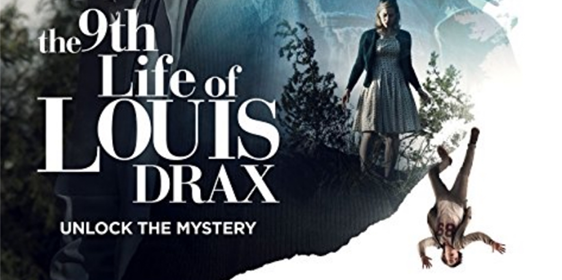Movie Review: The 9th Life of Louis Drax (By Melissa R. Mendelson)

Movie Review: The 9th Life of Louis Drax
by, Melissa R. Mendelson
They say that a mind is a terrible thing to waste. Yet, we waste ours on mindless television, mediocre tasks at work, mind-numbing commutes, listening to endless babble on the radio, and by day’s end, our minds are screaming to be switched off. Try to think tomorrow, if your mind’s not gone yet, and with the uncertainty and fear that now surrounds us in today’s world, who even wants to think about it? It’s better to have the Ostrich Syndrome, where we stick our heads in the ground and think of nothing but dirt. A mind is a terrible thing to waste, and if we could just stop for one moment, just one moment, maybe we would realize how intricate and secretive our minds really are with a labyrinth of fiction and imagination waiting to unfold and swallow us whole. But do we need to die first to discover what truly lies inside?
In Stephen King’s book, Dreamcatcher, there is mention of a room with file cabinets cluttered with the thoughts and memories that we keep inside. Most of our minds probably mirror a lawyer’s office with a cascade of papers flowing everywhere, but what if we could organize our minds? What if we could tuck away our deepest, darkest secrets and lock them in a drawer, where nobody could access them? Would we forget that it was there, or would a time come, where we would have to face the ugly truth, a truth that could set us free and finally end the nightmare?
We are not Professor X, no matter how much we want to be, and we’ll never be Scarlett Johansson’s Lucy. Maybe, we’re Algernon, struggling to grasp what lies within reach, but the mind is its own machine. It could splinter into a thousand thoughts, creating an alternate Identity, or it could devise its own escape as if trapped in a mortuary drawer like in the movie, The Jacket with Adrien Brody. The mind is its own beast, and the illusion is that we think that we can control it. But when our guard is down, it is the mind’s subconscious arm that picks us back up and leads us around and around as if we are searching for something, but we never know what that is. We may never know what that is unless we find the drawer, where our mind has locked it away. And it will always haunt us because we can feel the wheels of our mind turning, trying to tell us something, but are we listening? What if it is not our own mind reaching out to us? What if it is someone else, someone that feels safer in hiding but yet wants to be heard?
There are many horrors that lie deep within the mind, but what if they are merely shadows of what we cannot see in the real world like a soft beauty concealing a cold heart? A tragic loss buried beneath a vicious crime? An expectancy of life surpassing its expiration? These horrors are nothing more than a heavy book waiting to fall and crush those below, but still we look because the darkness is looking back. And despite its monstrous, black form, we realize something. We realize that the darkness has a human heart, and its heart bleeds as if cut in two. But we cannot stay locked away in a cave far from the world and forget all that we are. We have to let go, no matter how hard the struggle. We have to stop hiding and allow our minds to surface to try again, to live again, and that is the challenge. That is the challenge for Louis Drax, and it is his story, his ninth life that makes us realize how fragile life really is and how the mind will always survive.
Author Bio:

Melissa R. Mendelson graduated college with both an AA in Liberal Arts and BA in Mass Communication: Critical Analysis. She was a Long Island news reporter from 2002 to 2004 and later went to work for the State of New York. She has written a variety of writing that continuously is published by the Antarctica Journal News, and she recently finished writing her first Horror/Sci-Fi novel, Lizardian, which can temporarily be found as an E-book on Amazon Kindle.

 Print
Print